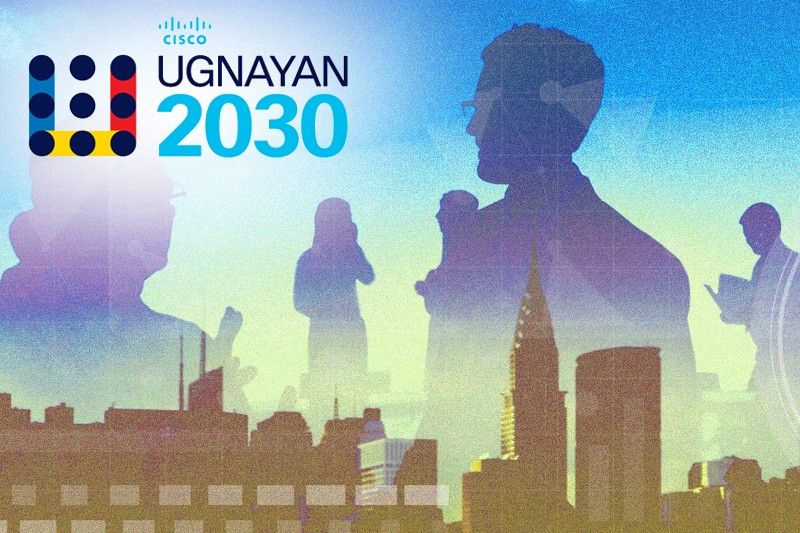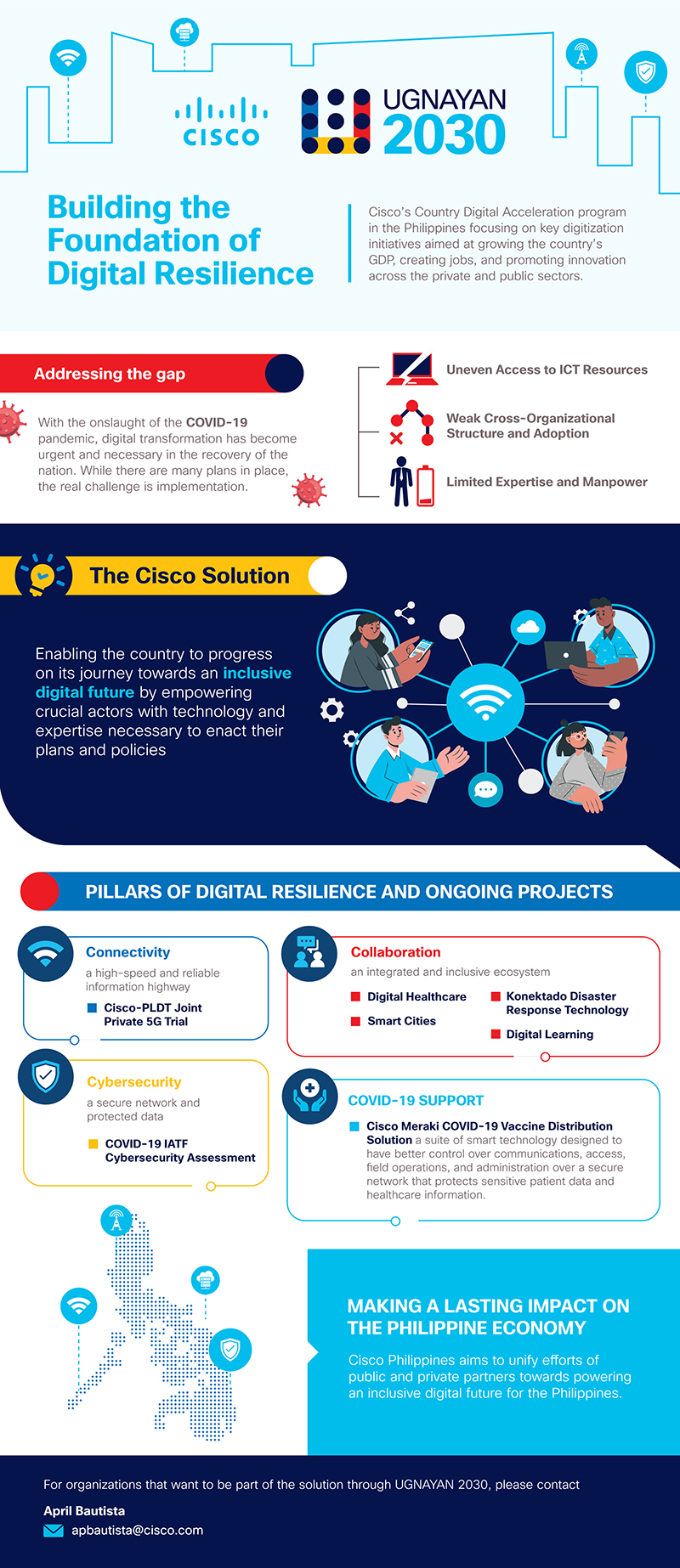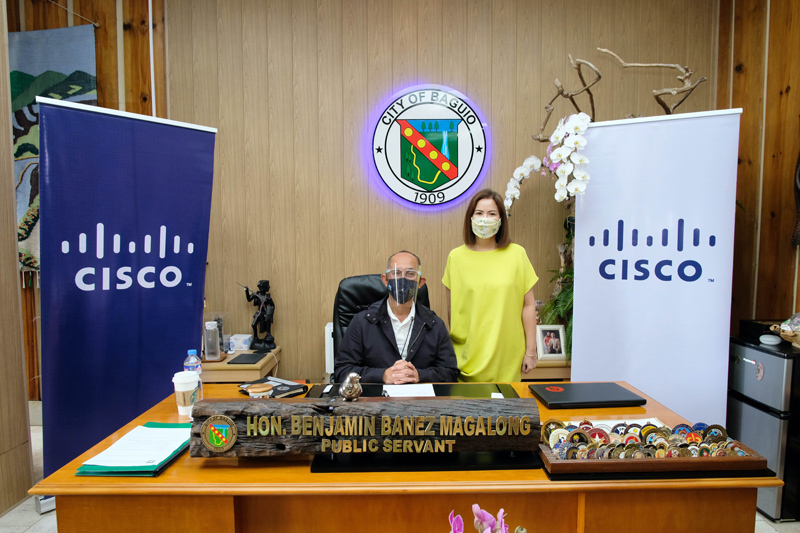Ugnayan 2030: Cisco inaugurates 10-year program to accelerate country’s digitization

MANILA, Philippines — In recent years, a paradigm shift towards digitization had already begun across different nations in Southeast Asia. This digital shift became more important than ever when the COVID-19 pandemic hit, disrupting the many ways people live, work and play.
“As the COVID-19 pandemic moved us deeper into a digital world, accessing education, establishing and maintaining a livelihood, and obtaining government and other critical services became vital. The pandemic has further highlighted the importance digital resilience plays not just for companies and businesses, but for the overall economy,” Karrie Ilagan, managing director of Cisco Philippines, said.
Cisco's Country Digital Acceleration (CDA) program is a long-term partnership with national leadership, industry and academia. By accelerating the national digitization agenda, the country will grow GDP, create new jobs and provide innovation and education across public and private sectors.
In the Philippines, it takes the form of Ugnayan 2030, which aims to build greater digital resilience through a collaborative framework with government agencies, industry partners and the academia.
“As a developing country, the Philippine government is appreciative of support from the private sector who share DICT's vision of an inclusive digital future,” Department of Information and Communications Technology (DICT) Under Secretary Manny Caintic told Philstar.com in an exclusive interview.
“As an ongoing collaboration framework, Ugnayan 2030 has been moving forward to help achieve locally-sustained results, strengthen local capacities, and accelerate enterprise-driven development especially across flagship projects that Cisco has identified,” he added.
Bridging the gap
The problem on digital transformation is not isolated in the Philippines as our neighboring countries in Southeast Asia face similar challenges.
According to Ilagan, one common issue is the existence of the digital divide within emerging economies like the Philippines, where only 60% of households have limited internet access. In South East Asia, almost one-third of the population remain excluded from any kind of digital technology.
Ilagan has further highlighted the gaps in digital literacy and talent in the region.
“Gaps in digital literacy and talent emerge as pain points amidst rapid digitalization. A UNICEF report found that most young people in ASEAN hold a moderate level of digital literacy, but there is a stark digital divide between countries, with more respondents from least developed countries (LDCs) evaluating their digital literacy as poor compared to non-LDCs,” she elaborated.
Cisco has already made big strides in this area through the Cisco Networking Academy, a global program created to transform the lives of learners, educators and communities through the power of technology, education and career opportunities.
In the Philippines, the company has trained over 450,000 students under the Cisco Certified Network Associate (CCNA) since its inception in 1998. Of this, 97% of students report that the CCNA program has assisted them to gain a new job or a better educational opportunity.
The courses have been conducted through 150 academic partnerships in universities, polytechnics and senior high schools, and has seen an in-kind investment of $142 million in the last two decades.
On the public front, government agencies continue to advance the country’s global competitiveness and address gaps in digital adoption. DICT, for one, has rolled out its national digital agenda. It has also adopted a new conceptual framework for digital readiness earlier this year.
However, challenges impair full implementation of these roadmaps and frameworks. Ilagan cited several factors such as uneven access to ICT resources, absence of an established ICT ecosystem where all the different users follow the same structures and protocols, and limited expertise and manpower.
That is where Ugnayan 2030 is stepping in to help integrate and align seemingly disjointed initiatives through Cisco technologies and expertise.
”It is focused on creating a platform on which existing, ongoing and upcoming ICT-related plans can be enacted, whether it be access to Cisco technology, knowledge-sharing, or stakeholder engagement,” Ilagan said.

Fueling digital resilience
For Cisco, the goal is clear: to build the foundation of digital resilience with every administration, despite any calamity.
To achieve this, Ugnayan 2030 will focus on three key pillars: Connectivity in building a high-speed and reliable information highway; Collaboration in building an integrated and inclusive ecosystem; and Cybersecurity in securing these built networks and protecting available data
Since launching Ugnayan 2030 last year, Cisco has already introduced several projects that are not only relevant for the long-term goals of the framework, but have also helped in improving the pandemic response in the country.
Among these are Cisco-PLDT joint private 5G trials, which enabled both parties to deep-dive into the best solutions that will enable enterprises to leverage on the benefit of 5G in terms of speed, security and reliability.
Application to manufacturing is being explored in developing the first sandbox for the use of 5G technology in the manufacturing industry. Some of the applications to be developed are fixed wireless access for real time high-speed data collection, usage of smart tags to automate the tracking of inventory, and predictive maintenance.
Believing in the power of collaboration, Ugnayan 2030 has partnered with the Department of Health (DOH). It upgraded DOH’s COVID-19 Hotline to accommodate 100 seats and enhanced it with local mapping features.
Cisco also donated additional licenses for different barangay health centers to improve teleconsultations.
Ugnayan 2030 collaborates with local governments and Disaster Risk Management Councils to create Smart Cities. In Baguio City, a state-of-the-art command center is underway to help ensure citizens’ safety.

Also for rollout on LGUs are Project Konektado, a communication solution for calamities, and Connected Learning, mobile and portable connectivity solutions for better online learning. Already a pioneer in innovative solutions, Pasig City is the first local government unit to have both solutions power the city’s capacity-building measures for disaster preparedness and continuing education.
Cisco has also developed a Cybersecurity Management Framework for the COVID-19 Interagency Task Force to identify security gaps and provide security improvements for the agency.
The most recent and most urgent addition to Ugnayan 2030 platform is the Cisco Meraki Vaccine Distribution Solution. This supports the safe, secure and efficient administration of COVID-19 vaccines through automation technology and Artificial Intelligence. The solution can scale, streamline and improve the complicated process of vaccine safety and distribution.
Several local government units and organizations are already being onboarded with the solution rollout to begin in the next few months.
All hands on deck
Technology unlocks opportunities for the country to bounce back, from boosting the economy to providing more jobs and improving social services like education, healthcare and security. It will play a crucial role in Southeast Asia’s recovery, pushing them to be more aggressive and strategic in their digital acceleration programs.
As Ilagan said, “Digital transformation has become paramount for governments and companies in the SEA region. Digitalization, aided by the advent of 5G, will help drive more inclusivity and opportunity by delivering more digital services to underserved populations and communities and enhance overall resiliency.”
“At Cisco, we are committed to building an inclusive future where no one is left behind. Cisco’s CDA Program plays a key role in that by developing strategic partnerships with governments across the world. We are looking forward to the positive impact that initiatives under Ugnayan 2030 will deliver to the people of the Philippines and its economy,” she added.

Through Ugnayan 2030, big leaps have already been taken by Cisco and the government in making digital transformation a reality in the Philippines. However, this pursuit is not theirs alone.
Digital inclusivity, being a shared vision by everyone, needs participation by the public sector and government agencies, hand in hand with private initiatives like Ugnayan 2030. Together, we can move the country toward a digital-inclusive future.
To know more about Cisco's innovations and initiatives like the Ugnayan 2030, you may follow them on Twitter or visit newsroom.cisco.com.
- Latest





























